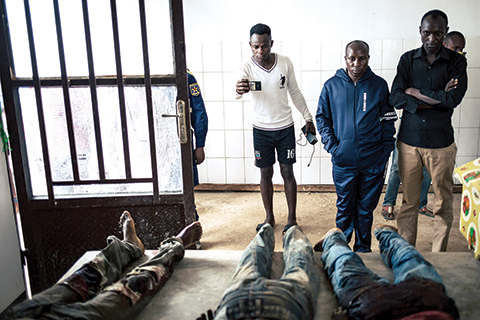

KINSHASA: DRCongo yesterday announced that key elections due to take place nationwide onDecember 30 would be postponed to March in two regions troubled by violence.But those delays will not affect the timetable for the presidential ballot,which is being held alongside legislative and provincial elections, thenational election commission CENI said.
Already postponedthree times, the elections are due to bring the curtain down on the era of PresidentJoseph Kabila, in charge of the vast mineral-rich country for nearly 18turbulent years. "The elections in the Beni region and the cities of Beniand Butembo in North Kivu province as well as Yumbi in the (southwest)Mai-Ndombe province initially scheduled for December 30 will now be held inMarch," CENI said.
The final resultsof the presidential vote will be published on January 15, and the nextpresident will be sworn in on January 18, CENI said. It did not explain howthis outcome would dovetail with the vote in the troubled regions, whichpresumably would take place around two months after the presidentialinauguration. A total of 1,256,117 registered voters in the troubled regions,out of a nationwide electoral roll of 44 million, are affected by the delay.The elections were due to have been held on December 23, climaxing a longperiod of blood-stained turbulence. But CENI ordered a week-long postponement,blaming a warehouse fire that destroyed voting machines and ballot papersearmarked for Kinshasa.
Unstable
The DemocraticRepublic of Congo, the second biggest country in Africa, has a long history ofpolitical turmoil and violence. It has never had a peaceful transfer of powersince it gained independence from Belgium in 1960. In 1996-1997 and 1998-2003it became the theatre of two wars that left millions of dead and homeless andsucked in countries from around central and southern Africa.
Smaller conflictsare unfolding in the east, where swathes of the countryside are in the grip ofbrutal militias. The CENI statement pointed in particular to parts of NorthKivu province, affected by "a terrorist threat" and "adangerous, ongoing epidemic of Ebola virus" in the areas of Beni andButembo. Since 2014, hundreds of civilians have been killed in attacksattributed to the Allied Democratic Forces (ADF), a shadowy Islamist-rootedgroup that arose in western Uganda in 1995.
Ebola fears
Since August 1,354 people have died in an outbreak of Ebola, whose epicentre is the Beni region,according to official figures. "Elections cause major movements of votersto polling sites, causing the people to gather and mix, which increases therisk of spreading the disease and providing an opportunity for terroristattacks, " CENI said.
At the other endof the country, in the southwestern province of Mai-Ndombe province,"deadly incidents" occurred in the territory of Yumbi on the night ofDecember 14-15, it disclosed. The violence "led to massive displacement ofpeople, the destruction of all electoral equipment and document, (and) theransacking of CENI warehouses and sites," it said.
Kabila tookoffice in 2001 at the age of just 29 after succeeding his assassinated father,Laurent-Desire. His long spell has been sharply criticized by rights andanti-corruption watchdogs, and his final years marked by protests that werebloodily quelled. He was due to step down at the end of 2016 after reaching theend of his constitution-limited two terms in office.
But he stayed on,invoking a caretaker clause in the constitution that enables a president tostay in office until a successor is elected. The elections were postponed untilthe end of 2017 under a deal brokered by the powerful Catholic church -- andthen again until 2018, when Kabila eventually confirmed he would not run again.- AFP

